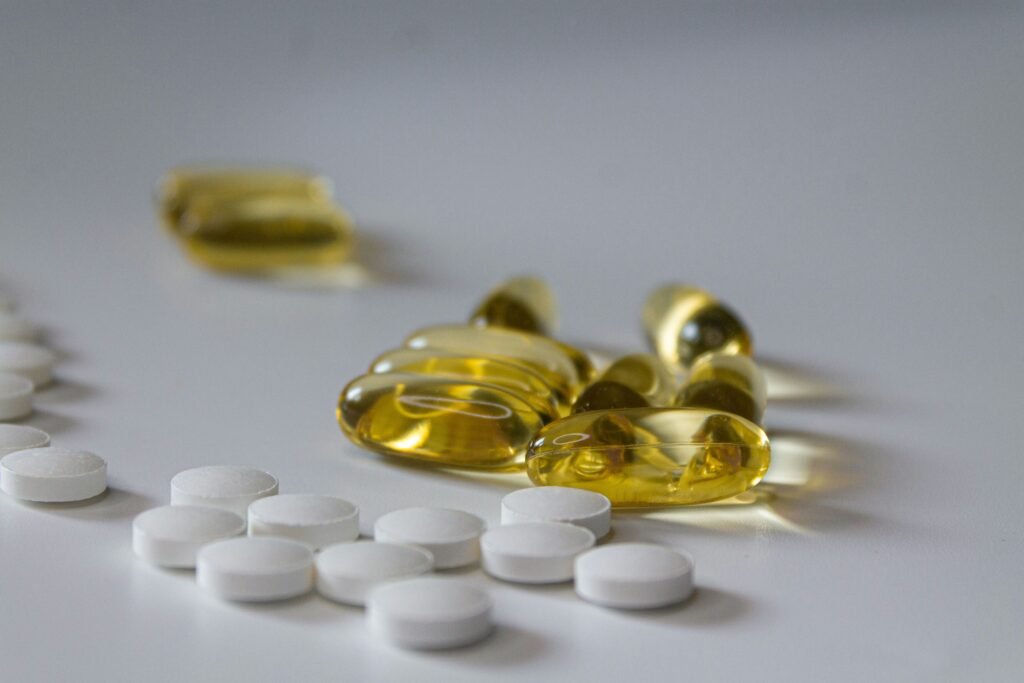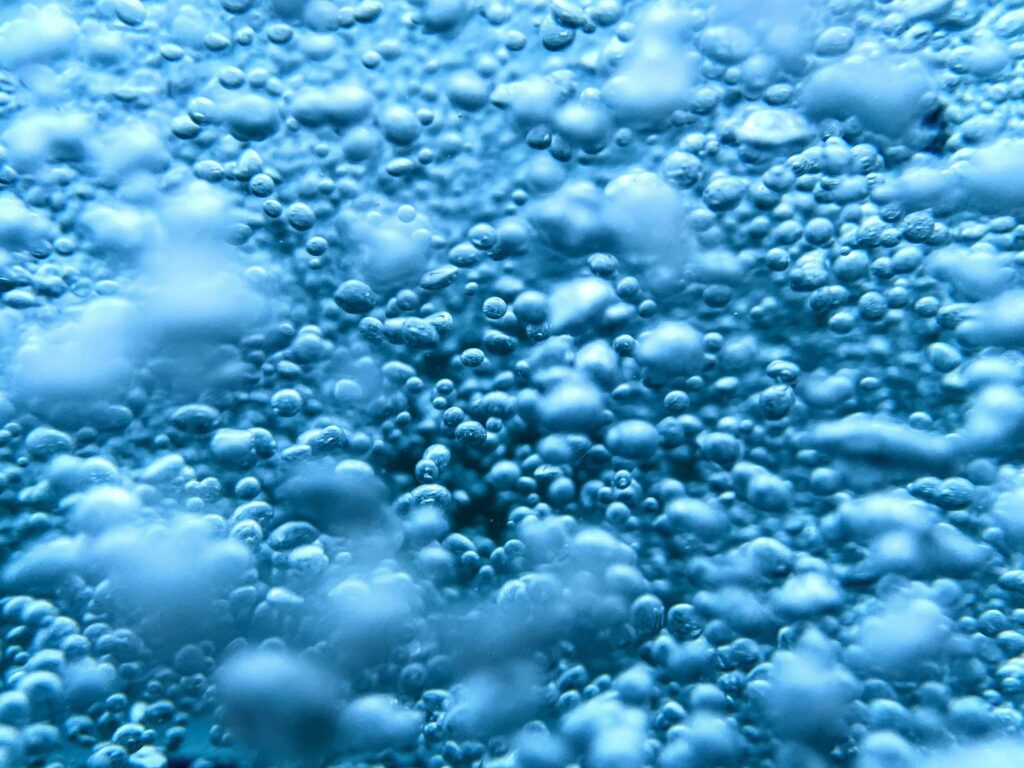Top 5 Creatine Monohydrate Supplements for Optimal Recovery and Muscle Gains
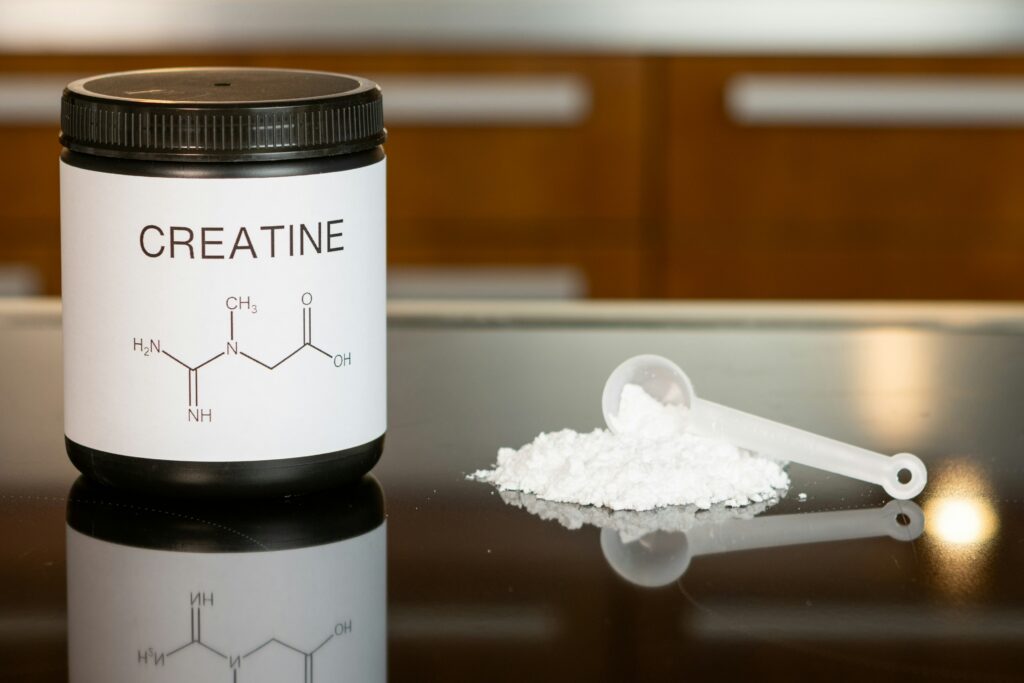
Creatine monohydrate has the potential to transform athletic performance and physique development for all kinds of sports and fitness enthusiasts. This powerful supplement has stood the test of time, consistently delivering results for countless athletes and bodybuilders. In this comprehensive guide, we’ll take a close look at the top 5 creatine monohydrate products on the market and how to use them effectively.
The Importance of Creatine Monohydrate
Creatine monohydrate is a naturally occurring compound that plays a crucial role in energy production within our muscle cells. By supplementing with creatine, we can increase our body’s phosphocreatine stores, leading to improved performance during high-intensity, short-duration activities like weightlifting and sprinting.
The benefits of creatine supplementation include:
- Enhanced muscle strength and size
- Improved power output during workouts
- Faster post-workout recovery
- Increased muscle glycogen storage
- Better performance in high-intensity exercises
Now, let’s dive into the top 5 creatine monohydrate supplements that have consistently delivered results:
1. Optimum Nutrition Micronized Creatine Powder
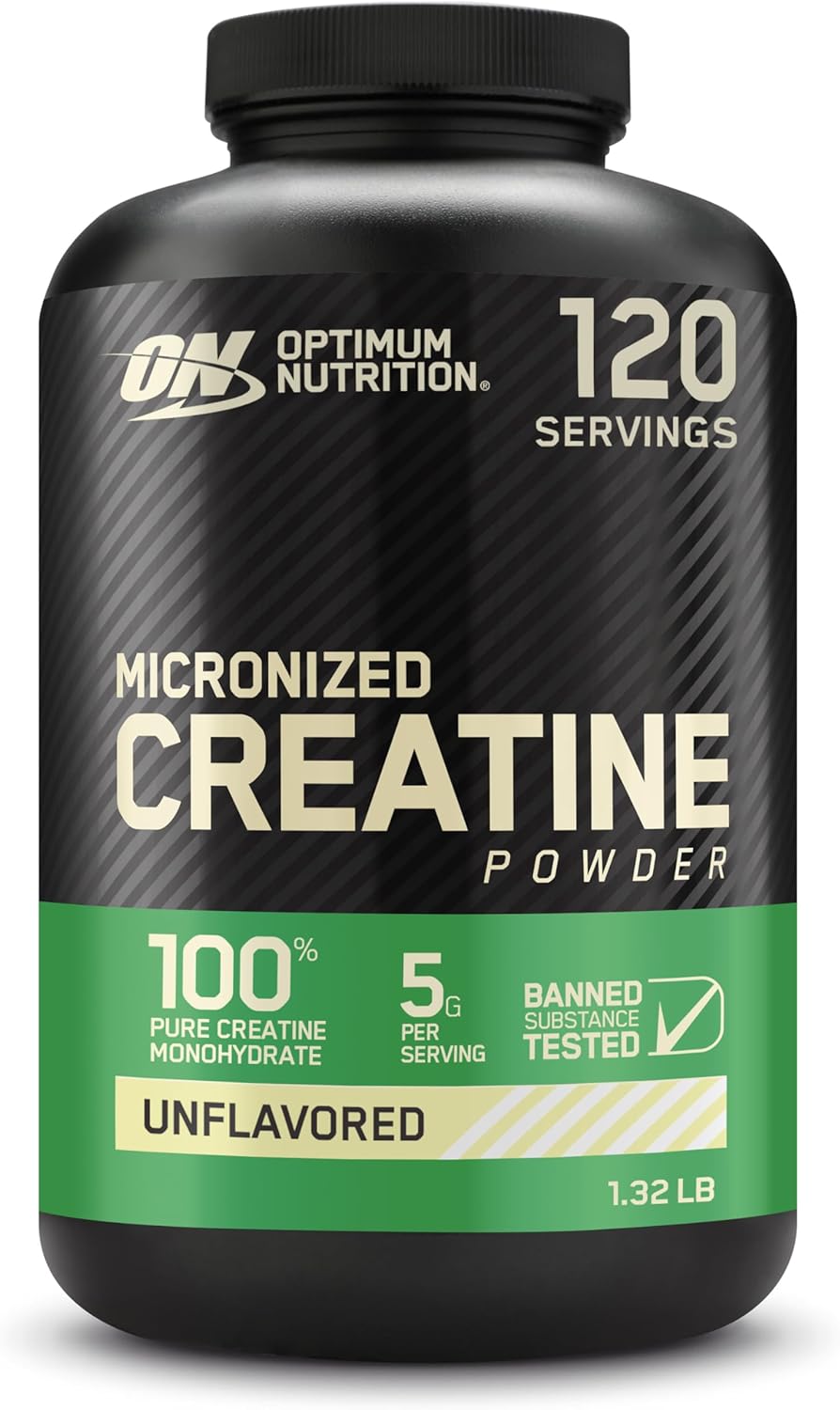
Optimum Nutrition has built an impressive reputation in the supplement industry, and their Micronized Creatine Powder lives up to the hype. This product features pure creatine monohydrate in a micronized form, meaning the particles are much smaller than standard creatine.
Benefits:
- Enhanced solubility for better absorption
- Reduced likelihood of digestive discomfort
- Improved muscle strength and size
- Enhanced power output during workouts
- Faster post-workout recovery
How to use:
Mix one rounded teaspoon (5 grams) with water or your favorite beverage. For best results, take immediately after your workout or first thing in the morning on non-training days.
Why it stands out:
The micronized form of this creatine powder sets it apart from many competitors. The smaller particle size means it dissolves more easily in liquids, reducing the gritty texture some users dislike. This improved solubility may also lead to better absorption by the body, potentially enhancing its effectiveness. Optimum Nutrition’s commitment to quality control is another major selling point. They use rigorous testing procedures to confirm each batch meets their high standards for purity and potency. This attention to detail gives users confidence in the product they’re consuming.
2. MuscleTech Cell-Tech Creatine Powder
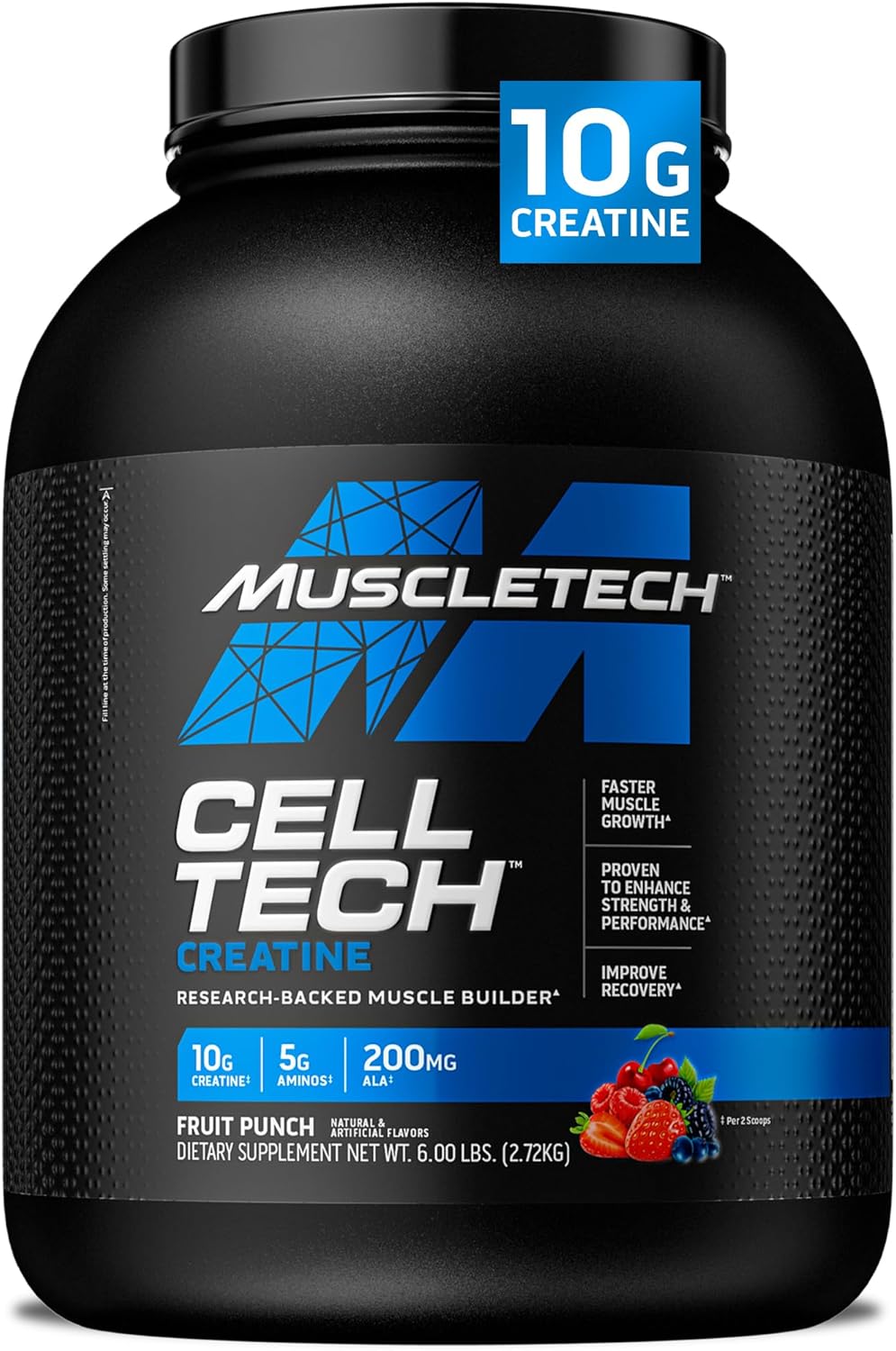
MuscleTech’s Cell-Tech takes creatine supplementation to the next level by combining creatine monohydrate with a precise ratio of carbohydrates. This formulation is designed to spike insulin levels, promoting faster and more effective creatine uptake by your muscles.
Benefits:
- Rapid creatine absorption
- Increased muscle glycogen replenishment
- Improved strength and muscle fullness
- Enhanced post-workout recovery
How to use:
Mix two scoops with 8-16 oz of cold water. Consume immediately after your workout for optimal results. On non-training days, take one serving in the morning with breakfast.
The science behind Cell-Tech:
Cell-Tech’s unique formulation is based on research showing that combining creatine with fast-acting carbohydrates can enhance its uptake by muscle cells. The specific ratio of creatine to carbs in Cell-Tech is designed to create an optimal insulin response, which helps shuttle creatine and other nutrients into muscle tissue more efficiently. This product also includes alpha-lipoic acid, an antioxidant that may further enhance creatine and glucose uptake by muscle cells. The addition of taurine and alanine may support cell volumization, potentially leading to greater muscle fullness and improved recovery.
3. BulkSupplements Creatine Monohydrate Powder
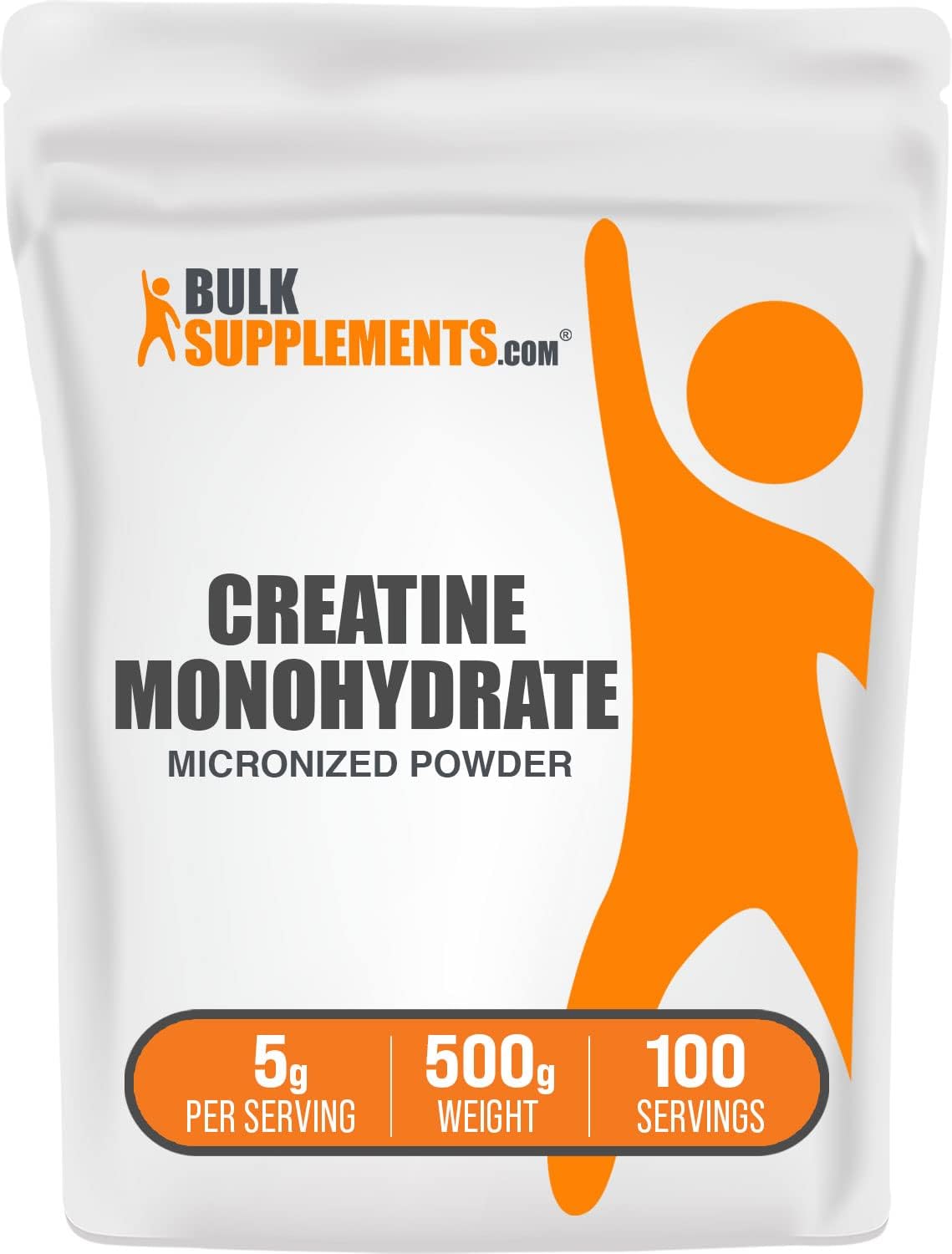
For those who prefer a no-frills approach, BulkSupplements offers a pure, unflavored creatine monohydrate powder. This product is perfect for users who want to avoid artificial sweeteners or add creatine to their existing supplement stack without altering the taste.
Benefits:
- Pure, unadulterated creatine monohydrate
- Versatile – can be mixed with any beverage or food
- Cost-effective option for long-term use
- No artificial additives or fillers
How to use:
Take one serving (5 grams) daily, preferably post-workout or in the morning on rest days. Mix with water, juice, or your protein shake for easy consumption.
The appeal of simplicity:
BulkSupplements’ creatine monohydrate stands out for its purity and simplicity. With no added ingredients, it’s an excellent choice for those who are sensitive to artificial sweeteners or who prefer to have finish control over their supplement intake. The unflavored nature of this product makes it incredibly versatile. You can add it to your morning smoothie, mix it into your post-workout shake, or even incorporate it into recipes without affecting the taste. This flexibility allows users to seamlessly combine creatine into their daily routine without the need for extra drinks or supplements.
4. Naked Creatine – Pure Creatine Monohydrate
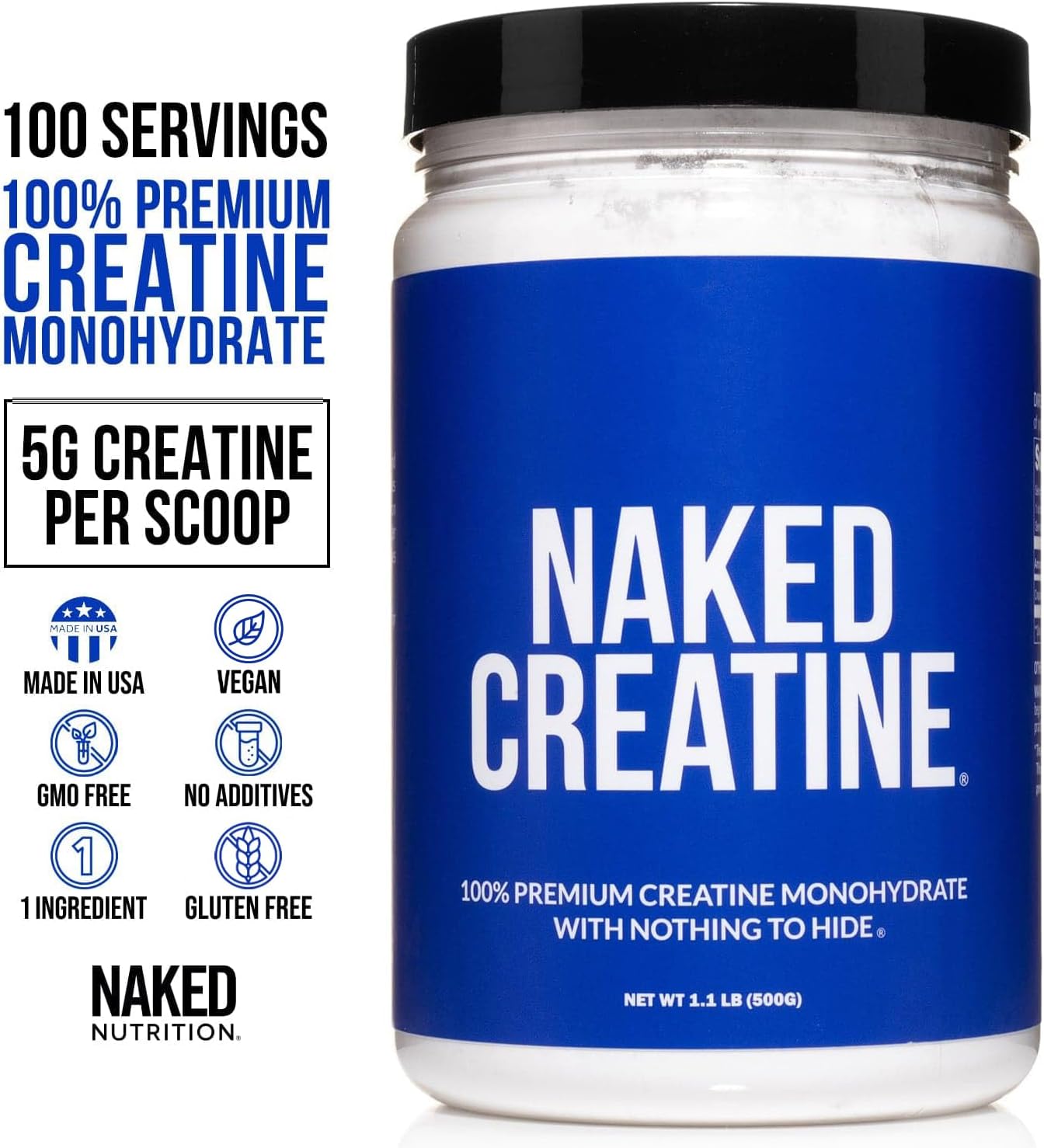
Naked Nutrition prides itself on producing supplements with minimal ingredients, and their creatine product is no exception. Naked Creatine contains 100 percent pure creatine monohydrate, sourced from Germany and tested for heavy metals and other contaminants.
Benefits:
- Third-party tested for purity
- No artificial additives or fillers
- Suitable for various dietary restrictions (vegan, non-GMO)
- Sourced from high-quality German creatine
How to use:
Mix one scoop (5 grams) with water or your preferred beverage. Consume immediately after your workout or with a meal on non-training days.
Commitment to transparency:
Naked Creatine stands out for its commitment to transparency and purity. The company provides detailed information about their sourcing and testing processes, giving consumers confidence in the quality of the product they’re using. The fact that Naked Creatine is third-party tested for contaminants is a significant selling point. This extra step confirms that the product is free from harmful substances and meets the label claims for creatine content. For athletes subject to drug testing or those simply concerned about supplement quality, this level of assurance is invaluable.
5. Nutricost Micronized Creatine Monohydrate Powder
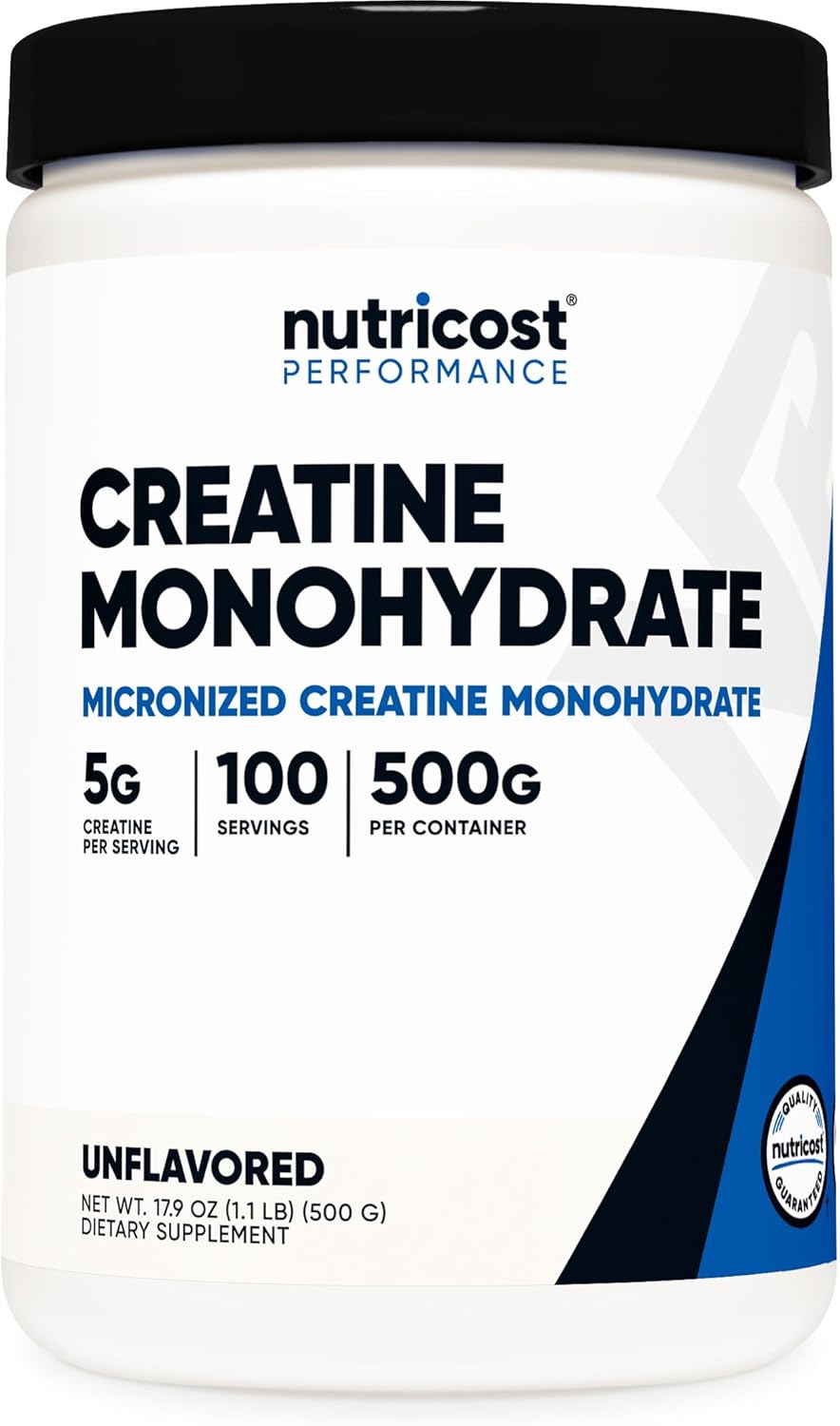
Rounding out our top 5 is Nutricost’s Micronized Creatine. This product offers a high-quality, micronized creatine monohydrate that dissolves easily and absorbs quickly. Nutricost has a strong following among serious athletes and bodybuilders for its consistent quality, price, and effectiveness.
Benefits:
- Supports cognitive and bone health
- Supports lean muscle growth and strength gains
- Aids in faster recovery between intense training sessions and prevent injuries
- Micronized for improved absorption
How to use:
Take one serving (5 grams) mixed with 8-12 oz of water or your favorite beverage. For best results, consume immediately after your workout or with a meal on non-training days.
The Nutricost difference:
Nutricosts’s Micronized Creatine stands out for its focus on purity and its cost-effective serving size. There are about 100 servings in the standard tub, which is great for those who supplement with creatine frequently. The micronized creatine is easy to digest and is great for anyone looking for an affordable, clinically-dosed creatine supplement.
Maximizing the Benefits of Creatine Supplementation
Now that we’ve covered the top 5 creatine monohydrate supplements, let’s talk about some general tips for getting the most out of your creatine supplementation:
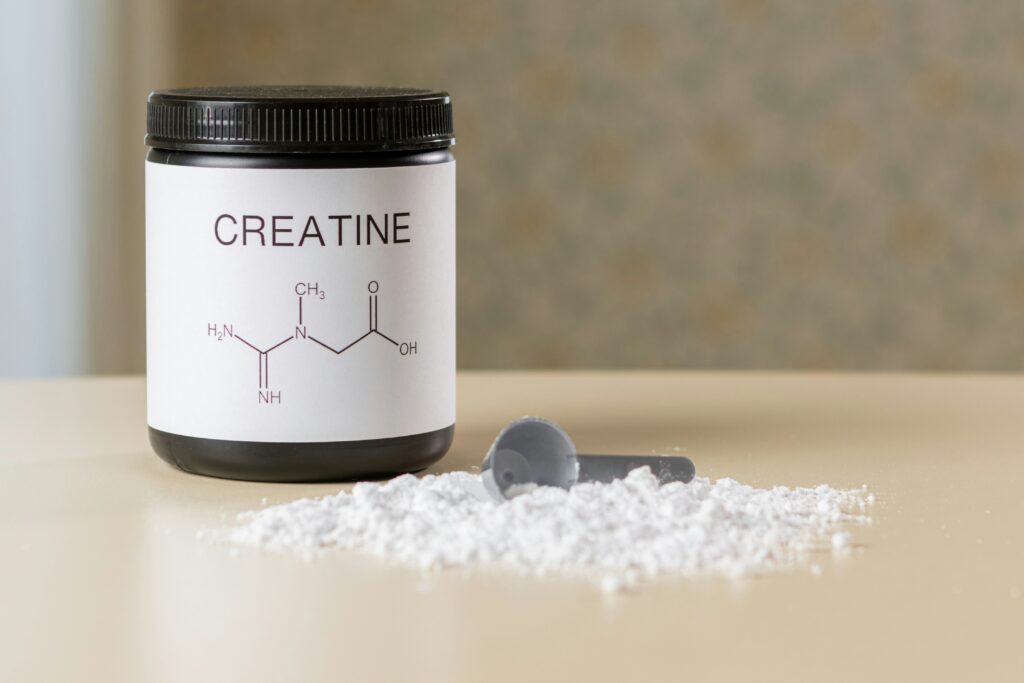
Consistency is Key
To fully saturate your muscle cells with creatine, it’s important to take it daily, even on rest days. This consistent intake confirms that your muscles maintain optimal creatine levels, allowing you to reap the full benefits of the supplement. Many users find it helpful to incorporate their creatine dose into their daily routine, such as taking it with breakfast or immediately after their workout. By making creatine supplementation a habit, you’re more likely to stick with it long-term and see the best results.
Stay Hydrated
Creatine draws water into your muscles, so it’s crucial to increase your water intake when supplementing. Aim for at least 8-10 glasses of water per day and consider drinking even more on training days. Proper hydration supports the effectiveness of creatine and helps prevent potential side effects like cramping or bloating. Increased water intake also has many other benefits for athletes and bodybuilders, including improved nutrient transport, better temperature regulation during exercise, and enhanced recovery. By prioritizing hydration alongside your creatine supplementation, you’re setting yourself up for optimal performance and results.
Timing Matters
While you can take creatine any time of day, consuming it post-workout or with a meal can enhance absorption. The post-workout window is particularly effective because your muscles are primed to take in nutrients, including creatine. If you’re taking creatine on non-training days, consider pairing it with a meal to improve uptake. The insulin response triggered by eating can help shuttle creatine into your muscle cells more effectively. Some users find that taking creatine with breakfast on rest days helps them maintain a consistent supplementation routine.
Consider a Loading Phase
Some users opt for a 5-7 day loading phase, taking 20 grams of creatine daily (split into 4 doses) before dropping to a maintenance dose of 5 grams per day. This approach can help saturate your muscles with creatine more quickly, potentially leading to faster results. However, it’s worth noting that a loading phase isn’t strictly necessary – you can achieve similar results over time by consistently taking the standard 5-gram dose. If you choose to do a loading phase, be sure to increase your water intake accordingly to support the higher creatine dosage.
Pair with Carbohydrates
Taking creatine with a source of carbs can improve uptake because of the insulin response. This is why products like MuscleTech’s Cell-Tech include carbohydrates in their formula.
If you’re using a pure creatine product, consider mixing it with fruit juice or taking it with a carb-rich meal to enhance absorption. The combination of creatine and carbohydrates can be particularly effective post-workout, as it may help replenish muscle glycogen stores more quickly and efficiently. This can lead to improved recovery and better performance in subsequent training sessions.
Be Patient
While some users report immediate benefits, it may take 2-4 weeks of consistent use to experience the full effects of creatine supplementation. Don’t get discouraged if you don’t see dramatic results right away. Stick with your supplementation plan and trust in the process – the benefits will come with time and consistency. During this initial period, focus on maintaining a consistent dosing schedule and pairing your creatine intake with proper nutrition and training. Keep track of your progress in terms of strength gains, muscle fullness, and recovery time to help you gauge the effectiveness of the supplement over time.
Cycle if Desired
While not necessary, some users cycle on and off creatine. A common approach is 8-12 weeks on, followed by 4 weeks off. This cycling method is based on the theory that it may help prevent your body from becoming desensitized to the effects of creatine. However, many users take creatine continuously without any loss of benefits, so cycling is a personal choice as opposed to a requirement. If you do choose to cycle, pay attention to how your body responds both during the on and off periods. This can help you decide the most effective supplementation strategy for your individual needs.
Creatine and Your Training Program
While creatine is a powerful supplement, it’s important to remember that it works best when combined with a well-designed training program. Here are some tips for maximizing the synergy between creatine supplementation and your workouts:
Focus on Compound Movements
Creatine is particularly effective for improving performance in high-intensity, short-duration activities. This makes it an excellent supplement for strength training, especially when focusing on compound movements like squats, deadlifts, bench presses, and rows. These exercises engage many muscle groups simultaneously, allowing you to lift heavier weights and stimulate more muscle growth. The increased strength and power output provided by creatine can help you push harder during these challenging lifts, potentially leading to greater gains over time.
Incorporate High-Intensity Interval Training (HIIT)
While creatine is often associated with strength training, it can also be useful for high-intensity cardiovascular work. HIIT sessions, which involve short bursts of all-out effort followed by brief recovery periods, rely heavily on the ATP-PC energy system that creatine supports. By incorporating HIIT into your training routine, you can take full advantage of creatine’s performance-enhancing effects while also improving your cardiovascular fitness and fat-burning potential. This combination of strength training and HIIT can lead to impressive improvements in both muscle mass and overall body composition.
Prioritize Progressive Overload
One of the key benefits of creatine supplementation is its ability to help you lift heavier weights and perform more reps. To fully capitalize on this effect, it’s crucial to apply progressive overload in your training program.
Progressive overload involves gradually increasing the weight, frequency, or number of repetitions in your strength training routine. This continual challenge to your muscles is what drives adaptation and growth. With creatine supporting your performance, you may find that you’re able to progress more quickly than before, leading to accelerated gains in strength and muscle mass.
Allow for Adequate Recovery
While creatine can help you push harder in your workouts, it’s important not to overlook the importance of recovery. The increased training intensity made possible by creatine supplementation can also increase your body’s need for rest and recuperation. Make sure to incorporate rest days into your training schedule and pay attention to your body’s signals. Proper sleep, nutrition, and stress management are all crucial components of recovery that will help you make the most of your creatine supplementation and training efforts.
Creatine and Nutrition
To get the most out of your creatine supplementation, it’s important to pair it with a solid nutrition plan. Here are some key considerations:
Protein Intake
Creatine works synergistically with protein to support muscle growth and recovery. Ensure you’re consuming adequate protein throughout the day, aiming for about 1.6-2.2 grams per kilogram of body weight. Good sources include lean meats, fish, eggs, dairy, and plant-based options like legumes and tofu.
Carbohydrate Timing
As mentioned earlier, taking creatine with carbohydrates can enhance its uptake. Consider timing your creatine intake with carb-rich meals or immediately after your workout when your muscles are most receptive to nutrients. Complex carbohydrates like whole grains, fruits, and vegetables are excellent choices for sustained energy and overall health.
Hydration
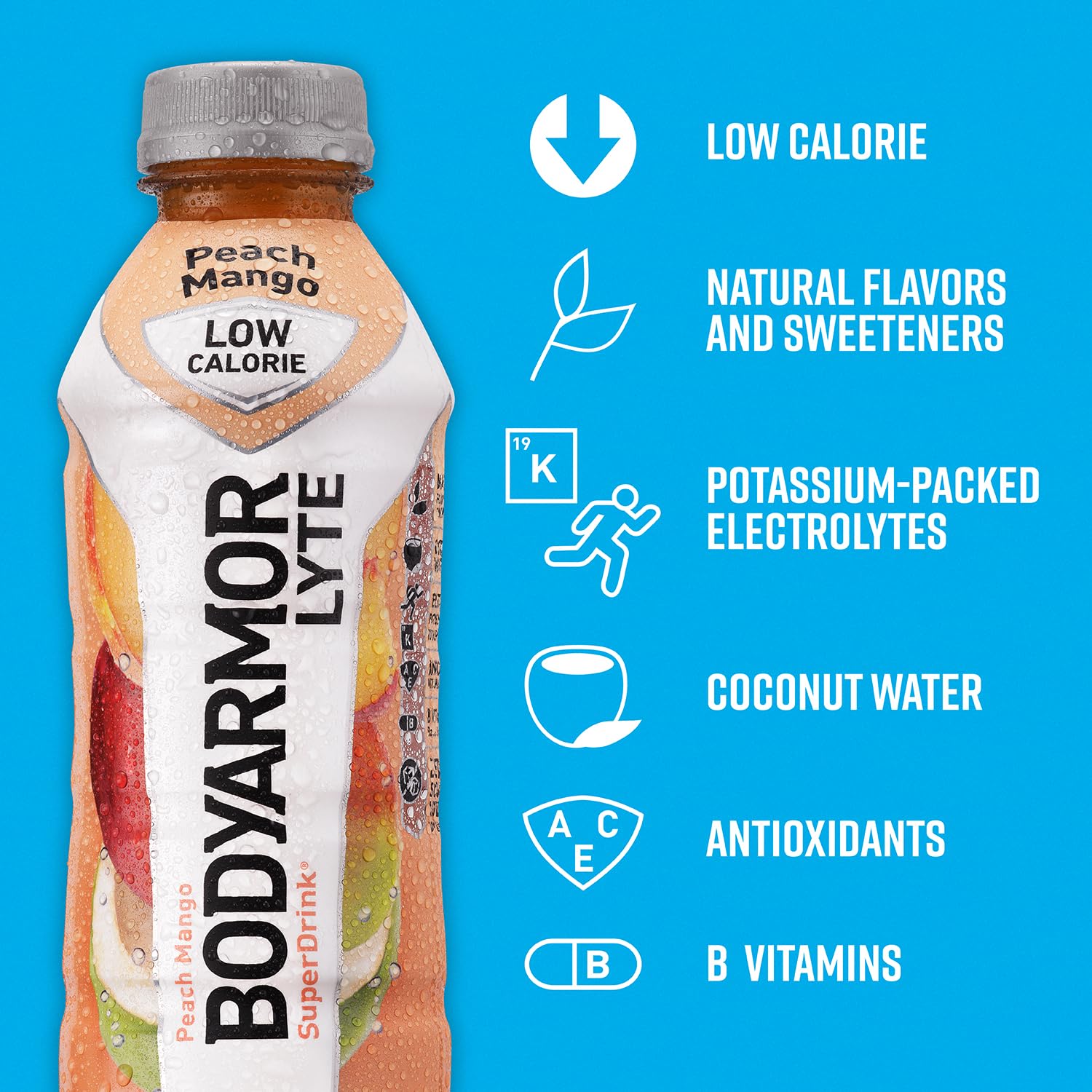
We’ve discussed the importance of staying hydrated when supplementing with creatine, but it’s worth emphasizing again. In addition to water, consider incorporating electrolyte-rich foods or beverages to support proper fluid balance, especially if you’re engaging in intense training or live in a hot climate. One example is BODYARMOR LYTE Sports Drink Low-Calorie Sports Beverage, which offers several flavors to make hydrating simple and tasty.
Micronutrient Support
While creatine is a powerful supplement on its own, its effects can be enhanced by ensuring you’re not deficient in other key nutrients. Pay particular attention to your intake of B vitamins, which play a crucial role in energy metabolism. A varied diet rich in fruits, vegetables, and whole grains will help confirm you’re getting a full spectrum of essential vitamins and minerals.
Potential Side Effects and Considerations
While creatine is generally considered safe for most people, it’s important to be aware of potential side effects and considerations:
Water Retention
Some users may experience initial water weight gain when starting creatine supplementation. This is a normal effect of creatine drawing water into the muscles and typically subsides after the first few weeks of use.
Digestive Issues
In rare cases, some individuals may experience digestive discomfort when taking creatine. If this occurs, try splitting your daily dose into smaller amounts throughout the day or switching to a micronized form of creatine.
Pre-existing Conditions
If you have any pre-existing kidney or liver conditions, it’s important to talk to a healthcare professional before starting creatine supplementation. While research has not shown creatine to be harmful to healthy kidneys, it’s always best to err on the side of caution.
Drug Interactions
Creatine may interact with certain medications, particularly those that affect kidney function. If you’re taking any prescription medications, talk about creatine supplementation with your doctor before starting.
Frequently Asked Questions
What is creatine monohydrate?
Creatine monohydrate is a naturally occurring compound found in small amounts in certain foods and synthesized by the body. It plays a crucial role in energy production within muscle cells, particularly during high-intensity, short-duration activities.
How does creatine work?
Creatine works by increasing the body’s stores of phosphocreatine, which helps rapidly regenerate ATP (adenosine triphosphate), the primary source of energy for cellular functions. This leads to improved performance in activities requiring short bursts of intense energy.
Is creatine safe?
Creatine is one of the most extensively studied sports supplements and is generally considered safe for healthy people. Numerous studies have shown no significant adverse effects with long-term use when taken as directed.
How much creatine should I take daily?
The standard maintenance dose is 5 grams per day. Some people choose to do a loading phase of 20 grams per day for 5-7 days before dropping to the maintenance dose, but this isn’t necessary for everyone.
When is the best time to take creatine?
While creatine can be taken at any time, many users find it most effective when taken post-workout or with a meal. The insulin response from food can help enhance creatine uptake by muscle cells.
Can women take creatine?
Yes, creatine is safe and effective for women. It can help improve strength, muscle mass, and athletic performance in women just as it does in men.
Does creatine cause hair loss?
There’s no strong scientific evidence linking creatine supplementation to hair loss. The myth likely stems from creatine’s potential to increase DHT levels slightly, but this effect has not been shown to cause hair loss in humans.
Can creatine be taken with other supplements?
Yes, creatine can be safely combined with most other supplements, including protein powders, pre-workouts, and multivitamins. Always check for any specific contraindications and talk to a healthcare professional if you have concerns.
How long does it take to see results from creatine?
While some users report feeling effects within the first week, it typically takes 2-4 weeks of consistent supplementation to experience the full benefits of creatine. Patience and consistency are key.
Do I need to cycle creatine?
Cycling creatine (taking breaks from supplementation) is not necessary for most users. Many people take creatine continuously without any loss of benefits. However, some choose to cycle as a personal preference.
Key Takeaways
- Creatine monohydrate is a proven supplement for enhancing muscle growth, strength, and recovery.
- Choose a high-quality, micronized product for better absorption and mixability.
- Consistency in dosing and proper hydration are crucial for optimal results.
- Pairing creatine with carbohydrates can enhance uptake and effectiveness.
- Be patient and allow 2-4 weeks for the full benefits of creatine supplementation to become noticeable.
- Combine creatine supplementation with a well-designed training program and balanced nutrition for best results.
- While generally safe, be aware of potential side effects and consult a healthcare professional if you have pre-existing conditions or are taking medications.
To maximize your recovery efforts, explore Recovery Essentials Hub for additional workout recovery tips and products designed to help you achieve peak performance. Investing in high-quality recovery practices can make the difference between sluggish workouts and breaking new fitness records.
This post contains affiliate links. If you click on one and make a purchase, I may earn a commission at no additional cost to you. Rest assured, I only recommend products or services I believe will provide value to my readers.
